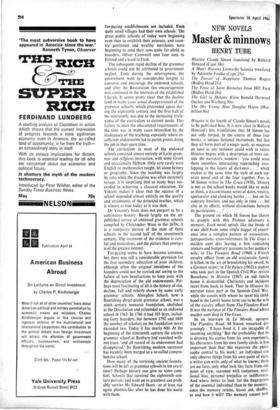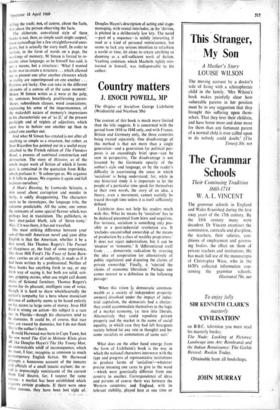NEW NOVELS
Master & minnows
HENRY TUBE
A Man's Blessing Leonardo Sciascia translated by Adrienne Foulke (Cape 25s) The Pursuit of Happiness Thomas Rogers (Bodley Head 25s) The Feast of Saint Barnabas Jesse Hill Ford (Bodley Head 28s) The Girl in Melanie Klein Ronald Harwood (Seeker and Warburg 30s) The Shy Young Man Douglas Hayes (Mac.. millan 30s)
Histoire is the fourth of Claude Simon's novels to be published here. It is now clear in Richard. Howard's fine translations that M Simon has not only forged, in the course of these Jour books, a unique fictional instrument, but that they all form part of a single work, as magnum an opus as any reviewer could wish to salute. Histoire begins with a description of trees out-. side the narrator's window: 'you could sense them countless intersecting superseding over- lapping in the layers of darkness . . .' which evokes .at the same time the style of each sep- arate novel and of the four together. For, as M Simon writes in The Grass (1958), 'History, is not as the school books would like to make us think, a discontinuous series of dates, treaties, spectacular and clanking battles . . . but on the contrary limitless, and not only in time . . . but also in its effects, without distinctions between its participants . .
The ground on which M Simon as chosen, to grapple with this Protean adversary 4: memory. Each novel spirals like the, inside of a sea shell from some single nugget of experi- ence into a complex pattern of associations,, juxtapositions, cross-references. In, The Gr.= a maiden aunt dies leaving a -box containing trinkets and budgetary accounts to her:nephew's . wife; in The Flanders Road (1960). a French cavalry officer from an old aristocratic family is killed, in the act of brandishing his sword, by a German sniper; in The Palace (1962) a student, who took part in the Spanish .Civil War revisits: Barcelona; in Histoire (1967) an old, family. house is dismantled. Characters and incidents recur from book to book. Thus in Histoire the, narrator takes part in the Spanish Civil War, while the cousin with whom he spent his child- hood in the family house turns out to be the wife of the cavalry officer from The Flanders Road. It was the narrator of The Flanders Road whose maiden aunt died in The Grass.
In an interview in Le Monde, apropos The Flanders Road, M Simon remarked dis- armingly : 'I have lived it. I am incapable of, inventing anything.' But the probability that he is drawing his stories from his own experience„, his characters from his own family circle, is less. important than that this expresses the philo-. sophy central to his work : an individual can only observe things from his own point of view, a writer can write only of what he knows; there are no facts, only what look like facts from o4c... point of view, seasoned with conjectgre, emo-., tional bias, personal prejudice or indifference/- And where better to look for the fingerprints of the essential individual than in the memory since the memory retains, leaves out, shuffles, as and how it will? The memory cannot help telling the truth; not, of course, about the facts, but about the person observing the facts.
The elaborate, convoluted style of these books is not, then, as simple souls might suspect, mere camouflage for a few straightforward-anec- dotes, but is actually the story itself. In order to imitate, in the form of words on a page, the workings of memory, M Simon is forced to re- create, since language, as he himself has said, is not a means, but a structure : 'What I wanted to do, was to create a structure ... which allowed me to present one after another elements which in reality are superimposed on one another . . . Painters are lucky. One can take in the different elements of a canvas all at the same moment.' Hence M Simon writes as it were at the gulp, his sentences breathlessly proliferating paren- theses, subordinate clauses, word associations; expressing his sense of the impermanence, of the makeshift nature of memory's impressions in his characteristic use of `as if,' of the present participle and of triplets of adjectives, which seem less to bolster one another up than to cancel one another out.
And what M Simon has created is not after all anything so simple as a structure, but rather, as lean Ricardou has pointed out in a useful essay attached to the French edition of The Flanders Road, a process of continual construction and destruction. The story of Histoire, as of the whole major work of fiction of which it forms part, is contained in the quotation from Rilke which prefaces it : 'It submerges us. We organise it. It falls to pieces. We organise it again and fall to pieces ourselves.'
A Man's Blessing, by Leonardo Sciascia, a slim novel about corruption and murder in Sicily, is oddly disappointing. The characters seem to be stereotypes, the language trite, the outcome predictable. All the same, one senses the remnants of some special flavour which-was perhaps lost in translation. The publishers, in their dust-jacket blurb, talk of `fierce irony.' Alas, if it was there, it has not travelled.
The most striking difference between your run-of-the-mill American novel and your ditto English is that the American; whether it be a first novel, like Thomas Rogers's The Pursuit of Happiness or, the fruit of some experience, like Jesse Hill Ford's The Feast of Saint Barn- alms, carries an air of authority, it reads as if it had been written by a professional. Neither of these books has anything fresh to say, or any fresh way of saying it, but both are solid, seri- ous, gripping stories, what one might call decent sticks of fictional furniture. Thomas Rogers's scores for its pleasant, intelligent tone of voice, though it is hard to share wholeheartedly the author's sympathy for a hero whose insodciant defiance of authority seems to be based entirely on his access to large sums of money. Jesse Hill Ford is strong on action—his subject is a race riot in Florida—though his characters tend to be dummies. It could be, of course, that race riots are caused by dummies, but I do not think that is the author's thesis.
Ronald Harwood was born in Cape Town, but his new novel The Girl in Melanie Klein gives off, like Douglas Hayes's-The Shy Young Man, an unmistakable whiff of inconsequence, which we must, I fear, recognise as common to much contemporary English fiction. Mr Harwood attempts a humorous account of the inmates and officials of a small lunatic asylum; the re- sult is depressingly reminiscent of the current West End theatre, for, I suspect the same reason: a market haS been established which requires certain products. If there were once other reasons, they have been lost sight of.
Douglas Hayes's description of acting and stage- managing, with sexual interludes, in the 'thirties, is pitched in a deliberately low key. The novel —part of a sequence—is mildly interesting if read as a kind of personal reminiscence, but seems to lack any serious intention to refashion a world or time, let alone to create anything so daunting as a self-sufficient work of fiction. Vaulting ambition, which Macbeth rightly mis- trusted in himself, was indispensable to his author.











































 Previous page
Previous page